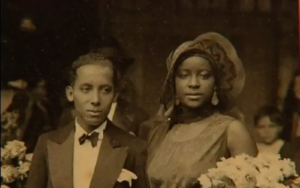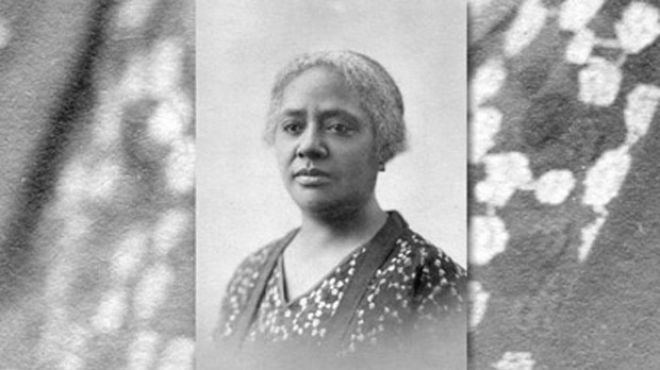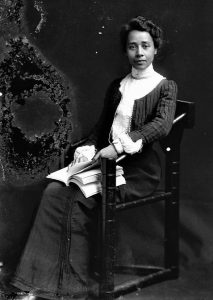This profile is included in a three-part series of Paris Pathfinders, authored by historian Julia Browne. More on Julia’s Walking the Spirit tours can be found here.
Paris Pathfinders Collection
Paulette Nardal
(October 12, 1896 – February 16, 1985)
 Paulette Nardal was an Afro-Martiniquais writer and journalist and one of the drivers of the development of a black literary consciousness
Paulette Nardal was an Afro-Martiniquais writer and journalist and one of the drivers of the development of a black literary consciousness
Paris after World War I beckoned. It was the crossroads of the African Diaspora and a cadre of women — whose autonomy and finances created the means — were among the Black artists and intellectuals who explored a transnational world of identity and legacy unknown in the countries of their birth.
Midway through the 1920s, Paris’ Black population was compact but consequential. Out of 2.8 million inhabitants they numbered only 10,000 French speaking Caribbeans students,1,000 Africans workers and students, and a few hundred African Americans including the cream of the Harlem Renaissance writers.
In that small land mass, the divide in language, culture and ideology was as vast as the ocean. One black francophone woman, Paulette Nardal, set out to close the gulf.
Nardal became the first black person to study at Paris’ prestigious Sorbonne University in 1920. The eldest of seven sisters, she was born into an upper-class conservative and accomplished family in the French Caribbean island of Martinique where her father was the country’s first black engineer. In a society rigid with racial hierarchy, this highly-regarded family was fiercely proud of its African heritage.
English degree in hand, the bilingual Paulette Nardal launched her lifelong focus on Pan-African themes. She was determined to defend and communicate Black values and did so in two unique ways: through cross cultural convergence in literary salons and publications supported by African, African American and Caribbean intellectuals and thought leaders.
The well-connected Nardal and two of her sisters, Jane and Andree, orchestrated with a feminine touch the art of conversation. Future black leaders envisioned their place in the new post-war order, charting their national histories and decrying anti-imperialism. Black internationalism was born.
At the same time among European colonial powers and throughout France, Black culture was systematically denigrated and fetichized. France gleefully displayed its conquests in the Colonial Exhibition of 1931. The Nardals exploited the printed word as their next sphere of influence: newspapers, articles, conferences and thought journals were a medium to spread ideas from Paris through the mainland France and to the colonies.
Paulette would transform from intellectual to journalist. Drawing from her earlier days writing for Black student newspapers, then co-creating La Depeche Africaine newspaper, Nardal founded the groundbreaking La Revue du Monde Noire /The Review of the Black World. Funding only stretched to publish six issues but the short-lived journal was a meeting place for Franco-Caribbean, African and Harlem Renaissance intellectuals and writers. Each volume fostered perspective among contributors, educated readers about black civilizations, and created a bond among Blacks of all nationalities.
Out of the magazine emerged the seminal Negritude Movement, inspired by the Harlem Renaissance. It took several years, however, for the male leaders of the movement to acknowledge Nardal as ‘the godmother’ who helped birth the game-changing movement.
Nardal excelled at building a vast network and nurtured within it women who shared in and spread the evolving politics of identity. The influential work of most of those women remains largely unknown outside of scholarly circles. For instance, Philadelphia’s Clara Shepard who sat on the board, wrote and translated for The Review of the Black World. Eslanda Robeson who had become more involved in race issues once beyond the U.S shores, introduced American readers to Paulette Nardal and Black Paris’ creative cosmopolitan reality through a profile in Dorothy West’s literary magazine Challenge.
That Nardal and her sisters were women helped open blocades across race, class and education lines. Paulette’s tireless activism for the independence of Ethiopia drew the participation of elite French women.
Nardal returned to Martinique in 1939 following a crippling accident, turning her focus to women’s voting rights, programs for social relief and international solidarity.
In 1976, she was awarded the Knight of the Legion of Honour, just as her father was. An honorary plaque now stands in Paris’ 14th district, in the Paris suburb of Clamart where they held their salon and in Martinique. There is a growing campaign to have her inducted into the French Pantheon – a hall of fame for the country’s great ‘men.’ Only five of the 79 resting there are women.




